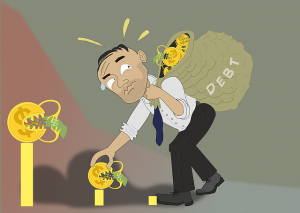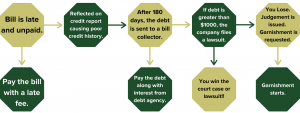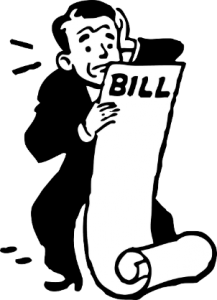 If the last year has taught us anything, it’s that life can be unpredictable! Maybe it’s the loss of a family member, or a change in income, but no matter what happens, bills continue to come. What happens to unpaid bills? For instance, without emergency savings, you and your family may need to make choices on which bills to pay.
If the last year has taught us anything, it’s that life can be unpredictable! Maybe it’s the loss of a family member, or a change in income, but no matter what happens, bills continue to come. What happens to unpaid bills? For instance, without emergency savings, you and your family may need to make choices on which bills to pay.
What happens to unpaid bills?
- Owe the original amount, plus late fees.
- After 180 days, it could go to a collection agency who will contact you about the original amount, late fees and interest.
- Amounts over $1,000 can go to court.
- A judge can order your wages be garnished for the amount plus fees and interest.

When your income is garnished, money is taken from your paycheck until the debt is repaid. If debt is owed to the federal government, like taxes or student loans, they can garnish wages without going to court. On the other hand, if debt isn’t owed to government, then the lender needs to go to court to garnish wages.
Unpaid bills lead to Poor credit. Which can impact more than you think.
- Want a new phone? You may be required to
 get a prepaid phone or be denied a standard phone contract.
get a prepaid phone or be denied a standard phone contract. - Need a credit card? You will pay higher interest rates.
- Opening a bank account? Banks and credit unions can refuse to open an account based on bad credit.
- Buying a house? Mortgage companies may deny or charge higher interest rates.
- Getting an apartment? A landlord can require a larger security deposit with a poor credit history or refuse to rent.
- Turning on utilities? Like landlords, utility companies can require a larger security deposit.
- Getting insurance? Insurance companies use credit histories as a factor in deciding price.
- Filing your taxes? If you owe the federal government money, the IRS can take your tax refund.
- Enlisting in the military? Career opportunities may be limited. Poor credit prevents security clearance for promotions.
- Increased credit card charges? The company must notify you of the change, but credit card companies can still increase the interest rate on new purchases.
What to do if you are contacted by a debt collector?
 If your debts are sent to a debt collector, they must send you a letter in writing. When they do, check the accuracy of the information. If it is not correct, you have 30 days from the date of the letter to dispute the debt in writing. However, you could receive a call before the letter arrives. They may be willing to set up a payment plan. Therefore, you need to know what you are able to pay before agreeing to a plan. In conclusion, the debt collection agency might not change the terms once it is in place.
If your debts are sent to a debt collector, they must send you a letter in writing. When they do, check the accuracy of the information. If it is not correct, you have 30 days from the date of the letter to dispute the debt in writing. However, you could receive a call before the letter arrives. They may be willing to set up a payment plan. Therefore, you need to know what you are able to pay before agreeing to a plan. In conclusion, the debt collection agency might not change the terms once it is in place.
How to avoid late payments.
- Set up Autopay. Many companies offer an autopay option. Likewise, they may offer a small discount if you set up autopay.
- Create Reminders. As an example, use your phone to set up payment reminders in your calendar.
- Act Quickly. Most importantly, if you forget to pay, contact the company right away. They may be willing to waive the late fee.
- Seek Help. The National Foundation For Credit Counseling (NFCC) can help connect you to resources and/or a non-profit member agency. From here you can get started with a financial review, establish a budget and develop a personalized financial action plan. If you prefer to call the NFCC, reach them at 1-800-388-2227.
 Check out https://www.facebook.com/moneysmartcolorado for Colorado State University Extension Agents bringing financial education, programs and discussions to Coloradoans everywhere. For more information on personal finances check out Colorado State University Extension’s publications at https://extension.colostate.edu/topic-areas/family-home-consumer/.
Check out https://www.facebook.com/moneysmartcolorado for Colorado State University Extension Agents bringing financial education, programs and discussions to Coloradoans everywhere. For more information on personal finances check out Colorado State University Extension’s publications at https://extension.colostate.edu/topic-areas/family-home-consumer/.

